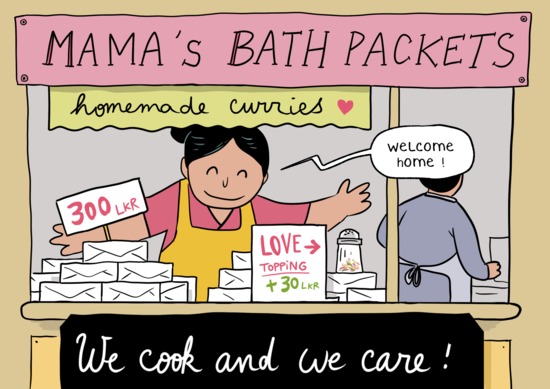Bath packets and gendered urban experience in Colombo
Download the complete communication (129 Ko)
.
Nipesh Palat Narayanan
Postdoctoral Researcher Department of Sociology, University of Colombo
Encuentra la versión en español:
Rice is a staple in Sri Lanka and is often eaten with three or more condiments.The paper explores the modes in which this staple transforms itself when it becomes a packaged commodity of ‘rice and curry’ (bath packets) in the city.Tracing the making, selling, and buying of bath packets, I build a three-pronged intertwined narrative,of: (i) gender performativity and perception in making, selling, and buying of bath packets,(ii) the implicit socio-economic codesand urban imaginations, and (iii) how the bath packet is itself transformed based on where and to/by whom it is sold. The bath packets are prepared by eateries, households, contractors and sold either in-house or via vendors. These bath packets arrive in various shops, eateries, and on the streets of Colombo from around 11:00 AM and is sold until 3:00 PM.Conceptually, the bath packet and people involved in making/selling/eating it are not analysed as merely operating inthe urban, but the urban as a co-constituent of this relationship which renders food as a socio-cultural construct.
I trace how urbanization has changed and fragmented the customary eating practices; i.e., it breaks the traditional idea of an eatery, to a scenario where cooking, selling, and eating happens in different geographical locations. This physical separation provides three distinct sites of enquiries, which present differing gender relations, city conceptualizations, and constructions about food. The sexualdivision-of-labourat the cooking stage, parity at the selling stage contrasted with the gendered marketing, and varying stereotypes (class and gender) of food preferences(as constructed by the sellers) are juxtaposed to investigate the gendered urban experience in Colombo. I enquire this primarily through the bath packet sold for lunch,using qualitative fieldwork consisting of 20 semi-structured interviews, 50 qualitative surveys, and participant observations. The paper primarily engages with urban knowledge production, its appropriation, legitimization, conflict, and subversion, via the socio-cultural constructs, gendered relations, and environmental processes around food.

